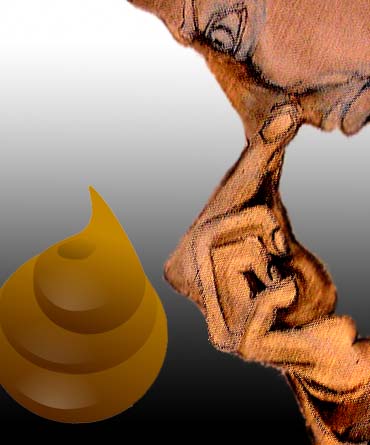In our Selected Exhortations category, we republish interesting stuff such as must-read articles and essays not originally written exclusively for the blawg, and which have come to our attention. Please feel free to email [email protected] if you would like to reproduce your writing, but first follow our Writer’s Guide here.
Foong Li Mei brings to you another edition of REFSA Rojak, a weekly take on the goings-on in Malaysia by Research for Social Advancement (REFSA).
REFSA Rojak – “trawl the newsflow, cut to the core and focus on the really pertinent. Full of flavour, lots of crunch, this is the concise snapshot to help Malaysians keep abreast of the issues of the day.”
 Bovine stink by any other name…
Bovine stink by any other name…
As accusations on the National Feedlot Corporation Sdn Bhd (NFC) ram its horns on the company’s weakening fences, some people are attempting to subdue the beast with the good ol’ stick of semantics.
Auditor-General Tan Sri Ambrin Buang stepped out to clarify that their report only stated “weaknesses in the implementation of the [NFC] project”. He had never used the word “mess” to describe it.
NFC executive director Wan Shahinur, who is also the son of Cabinet Minister Datuk Seri Shahrizat, echoed the AG’s assertion, pointing out that press reports “quoting the Auditor-General to having [used the word ‘mess’] is an allegation made out to mislead falsely and mischievously”. He welcomes audits by independent consultants to “clear the air” and “bring out the hard facts of the project”.
Semantics, however, did little to save the day. The Malaysian Insider quipped that the NFC is “not a mess, just a disaster”, charging that “now it does seem that Putrajaya is sanctioning what has happened”.
REFSA regards the “weaknesses, not mess” argument as a red herring to divert attention from the bigger picture – unanswered questions about the dubious expenditure of the public-funded project.
A rose by any other name would smell as sweet; and a mess by any other name would smell as foul.
The way to zero corruption
As public scrutiny zooms in on top ministers embroiled in financial scandals, pundits warn that political patronage comes into the limelight on the GE-13 stage. According to Transparency International Malaysia (TI-M) president Datuk Paul Low, people have become more aware of corruption and a recent survey found that 90 percent of Malaysians would ‘seize the opportunity to fight graft’.
With opposition leaders publicly declaring their assets, and judges to follow suit, all eyes are now on Barisan Nasional’s next move. A member of the Malaysian Anti-Corruption Commission (MACC) is for the declaration of assets as it aids investigations when a leader is accused of graft.
However, Minister Datuk Seri Nazri was dead set against the idea, claiming that such a revelation would make the people concerned a ‘target for robbers’. He added that a minister’s assets should only be made known to the Prime Minister and, if the PM insists, to the MACC.
Perhaps having more confidence in the police would help soothe Nazri’s agitation. After all, our men in blue are there to protect both the rich and poor.
Kapp-turing dissent
Nazri may be happy to reveal his assets to the Prime Minister, but to whom does the premier declare his assets? The question of wealth is bandied about in a controversy surrounding the PM’s wife Rosmah Mansor recently. She was labelled “First Lady of Shopping” by Australian columnist Andrew Hornery for reportedly spending A$100,000 (RM325,000) at Sydney designer Carl Kapp’s boutique. Rosmah dismissed the claim as “rubbish”, while Kapp issued a press statement stating that he had never divulged the amount Rosmah spent at his store.
Nonetheless, Hornery vouched for the veracity of his revelation, asserting that he had verified the amount with Kapp’s publicist.
The silver lining
With scandals plaguing the government, all is not lost as Malaysians have two things to smile about.
One, the Health Ministry has injected a dose of assurance into Malaysia’s healthcare. The Malaysian Medical Council (MMC) will be corporatised to make it more effective in monitoring medical standards, besides cutting back on red tape. The Malaysian Medical Association (MMA) welcomed the move which will curb any conflict of interest. Its president also gave the assurance that medical fees would not increase with the corporatisation.
Two, our judiciary system has received a boost of confidence. Shah Alam High Court Justice Zaleha Yusof has been nominated for a Gavel award in Women’s Link Worldwide for a landmark decision on gender discrimination. To vote for Justice Zaleha, visit www.womenslinkworldwide.org, click on Gender Justice Uncovered Awards, then select Nominated Decisions.
ABU-sed?
The Anything But Umno (ABU) movement said yes, but the police said no. Opacity clouds the rowdy disruption of the ABU-Hindraf ceramah (talk) in Shah Alam. ABU charged that a small mob of stick-wielding intruders had injured a member of the audience and threatened the rest, and backed its allegations with a video of the commotion. The police, however, claimed that they found no weapons at the scene, there was no damage to the venue and no one was injured.
Many were also outraged at the raucous disturbance of the gathering. NGOs questioned the police’s inaction, and even accused the officers of law of protecting the violent gang. The police denied the accusation, explaining that their delayed arrival at the scuffle was because they were not notified of the ceramah beforehand. Six youths aged 16 to 19 were detained to aid investigations.
Human rights commissioner Mohd Sha’ani Abdullah lambasted the police over what he deemed as the “stupidity” and immaturity of senior police officers and their statements.
ABU and Hindu Rights Action Force (Hindraf) had joined hands to oust Umno from Putrajaya, but Hindraf leaders are apparently split over their support for ABU.
Capturing a debate between entrepreneur Anas Zubedy and lawyer Haris Ibrahim, The Sun Daily columnist Oon Yeoh provided perspective on ABU’s approach: Is a blanket rejection of Umno an “unthinking way to choose our MPs and ADUNs”, or is it a necessary evil to prevent Umno from getting the required majority to form the next federal government?
______________________
Why ‘Rojak’? Disparate flavours and textures come together in a harmonious mix to make this delicious but underrated concoction. Our Rojak weekly is much like this mix, making sense of the noise of daily newsflow and politicking.
It is also our ultimate dream that our multi-ethnic melange of communities can be made richer within the unique ‘sauce’ that is Malaysia. Let’s take pride in the ‘rojakness’ of our nation!
Click here for previous issues of REFSA Rojak.
Visit us at http://refsa.org | Like us on our Facebook page | Follow our tweets @inforefsa


Paragraph writing is also a fun, if you know afterward you can write or else it is difficult to write.